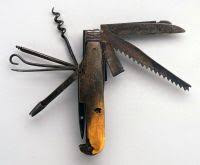Jefferson’s Knives: A Tale Of Two Future Presidents And William Shakespeare!
Jefferson’s knives, from several mentions, in his memorandum books, we know that Thomas Jefferson purchased a number of pocket knives between 1767 and 1819.
One of these knives looks a lot like a modern Victorinox Swiss Army Knife with about a dozen tools between the scales, with the
exception of its obvious carbon steel blades and its degrading wood handle. This last one can be seen in Jefferson’s collection at Monticello, and while interesting for many reasons including its likely Sheffield manufacture, and technology, has no real bearing on the tale at hand.It is sufficient to say that Jefferson seems to have been like many if not most Americans regarding the utility of keeping a pocket knife on one’s person.
Most men of letters in those days had somewhere about the office a knife of the type used to sharpen a quill pen, hence the term “penknife”. These were often desk knives of the sort sometimes used for letter openers today with a fixed blade and a short handle. At some point during the introduction of slip joint folding knives, perhaps even the first to be made, folding pen knives became popular for the writer on the go as well as others.
Our tale happened in April of 1786 and involves two future presidents of the United States who were visiting Europe and England while serving as understudies to Ben Franklin in France. Jefferson and Adams (Adams seemed to have been somewhat of a Shakspere “fanboy”) were on a tour of England and paid a visit to the home of William Shakspeare which had already by this time become a public attraction.
While the two were alone in Shakespeare’s writing room, Jefferson retrieved a pocket knife from his coat pocket and carved two splinters of wood from the bottom of the Shakspere’s chair! He put one in his pocket and one, he handed to Adams!
Jefferson and Adams had been best of friends and would remain so until presidential politics made them, for a time, near mortal enemies. This friendship was revived in later years and Jefferson and Adams died on the same day, of the same year, July 4, 1826. Though Jefferson died several hours earlier, Adams was not aware of this, and his final words were: “Jefferson lives!”
In a way, he still does!
